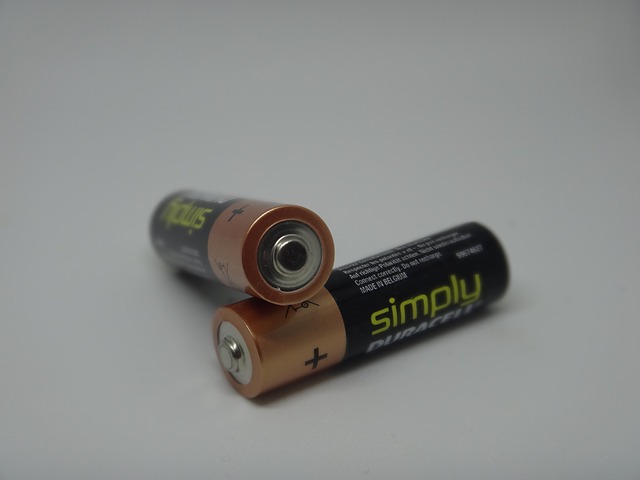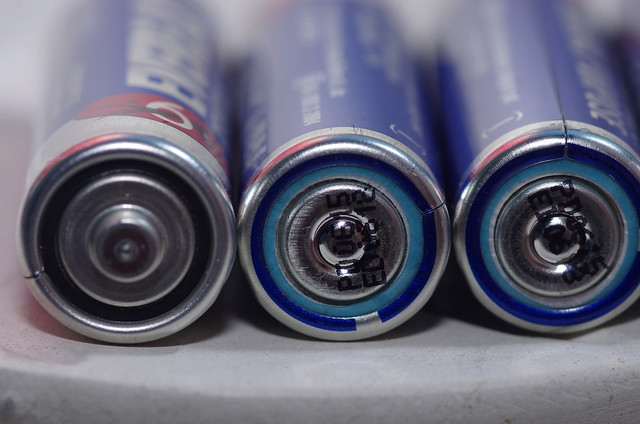Lithium vs Alkaline AA Battery Life
Dec 07, 2019 Pageview:8290
Alkaline and lithium batteries are the two types of batteries that can be used to power personal devices. These batteries have different combinations of chemicals and voltages.
Alkaline battery
As the name shows it has an alkaline electrolyte of potassium hydroxide. It derives the energy from the reaction between zinc metal and manganese dioxide. The AA-size alkaline battery has a capacity of 3000 mAh at a low load. The standard voltage provided by a fresh alkaline cell is 1.7 volts. The amount of the current is directly proportional to the size of the AA alkaline battery. It can deliver 700 mA without heating. The positive electrode is zinc and the cathode is made up of manganese dioxide. The electrolyte of potassium hydroxide does not take part in the chemical reaction. The alkaline potassium hydroxide remains in the cell because the negative hydroxide ion consumed is equal to the ions produced. The zinc anode is present inside the cell and after the ion-conduction separator, the manganese dioxide cathode is present.
Nowadays, alkaline batteries are designed for rechargeable purposes. The recharging process can rupture the battery and hazardous material leaked can corrode the equipment.?
Lithium-ion battery
In lithium-ion batteries, lithium compound is used as an anode and graphite is used to make the cathode. The reaction in the lithium-ion battery is between the materials of anode and cathode. The oxidation at anode produces positively charged lithium ions. The electrolytes and the external circuit for transfer of ions from one terminal to another terminal serve as conductive media for lithium ions. They do not take part in electrochemical reactions. The process of insertion or extraction in the battery allows lithium ions to move in and out of the electrode. Lithium batteries mostly come in a coin-shape. They are used to power watches and calculators.?
Power generation
Alkaline batteries use zinc and manganese oxide to provide energy. The zinc electrode undergoes oxidation and loses two electrons. Whereas, the reduction occurs at manganese oxide cathode. The electrolyte of alkaline batteries does not take part in power generation processes. The lithium batteries use lithium metals to make the anode as it is very reactive. The anode can also be made from other compounds of lithium. In lithium-ion batteries, the electrolyte does not take part in electrochemical reactions.?
Voltage
The replacement of the alkaline battery with a lithium battery is a good option. You need to know that the replacement of the alkaline battery with lithium batteries must provide the appropriate voltage and size. The lithium-ion AA battery provides 1.5 volts so they can be used to replace any regular alkaline AA batteries.?
Temperature
The lithium-ion batteries perform well even in the extreme temperature. This is because of the presence of lithium acid. The alkaline batteries seize to function in the hot climate. Lithium batteries can easily operate in an extremely cold or hot climate. This quality if lithium-ion AA batteries make their use perfect for outdoor devices.?
Weight
The lithium-ion batteries are much lighter as compared to AA alkaline batteries. Lithium-ion AA batteries can be conveniently used in portable devices.?
How long do lithium and alkaline AA battery last?
The lithium and alkaline batteries are made up of different materials which affect their performance. The lithium-ion batteries are designed to last for a long time. It makes them a good option for smart devices and other devices in which the changing of battery seems to be a problem. Lithium batteries are high performing alternative to an alkaline battery. The lithium-ion battery has many advantages over alkaline batteries. They are specially designed for cordless power tools and portable devices. Lithium batteries supply more energy than alkaline batteries. They are lighter in weight and have a very long shelf-life. The run time of an alkaline battery depends upon the size of the battery. These batteries have a shelf life of 5 – 10 years when stored at a room temperature. Lithium-ion batteries last only for 2 – 3 years even if they are not used. Try to avoid heat because it degrades the batteries.
Do lithium batteries last longer than alkaline?
Yes, the cycle life of the lithium-ion batteries is greater than the AA alkaline batteries. The lithium-ion batteries last 4 times longer as compared to AA alkaline batteries. You should keep in mind to charge the batteries properly by completing both stages of charging. Stage one is about the state- of – charge. Stage 2 is the saturation of the charges. If the recharging process of the lithium-ion battery is only done for stage one requirement. It will provide you the proper use but the battery life will be shortened. For a good and long battery life make sure you recharge your battery for both stages.
Which brand of lithium and alkaline AA battery lasts the longest?
Many of the compani3that manufacturing batteries market their product by telling about their durability and reliability. The alkaline batteries are made up of potassium hydroxide which is an alkaline solution whereas the lithium-ion AA batteries consist of the lithium salt electrolyte which is acidic. The longer life and lightweight of lithium-ion rechargeable AA batteries have enhanced their sales. The price factor is much important for the users. The lithium-ion battery is a bit expensive. But they have no environmental effects. It can be recharged at a low cost. Some of the brands dealing with alkaline and lithium-ion AA batteries are:
Energizer
Duracell
Eveready
Spectrum brands
Panasonic
You should know that a battery generates a current through a chemical reaction. See the manufacturing date of the battery before purchasing it. Try to read all the names of the chemicals a battery contains. Because a battery with more chemicals will last longer. Take into account that the shelf life and the cycle life are mentioned on the packaging.
- Prev Article: Best Lithium-ion Rechargeable AA Battery
- Next Article: 18650 Battery Brands & Buying
Leave Message
Hottest Categories
-
Hottest Industry News
-
Latest Industry News














